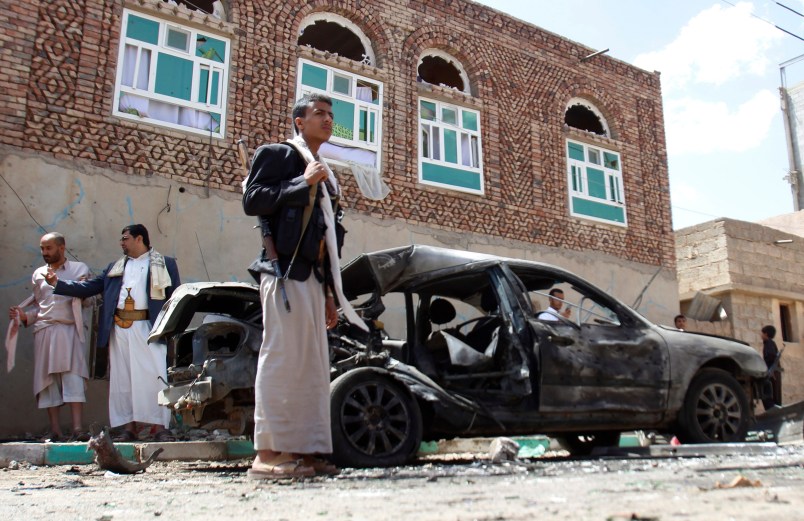Updated: March 20, 2015, 10:30 AM
ADEN, Yemen (AP) — Quadruple suicide bombers hit a pair of mosques controlled by Shiite rebels in the Yemeni capital, Sanaa, on Friday — unleashing blasts through crowds of worshippers and killing at least 46 and wounding 100, according to medical officials. The attacks were one of the deadliest in the capital since the rebels seized control six months ago.
The four bombers attacked the Badr and al-Hashoosh mosques, located across town from each other, during midday Friday prayers, traditionally the most crowded time of the week, according to the state news agency. While both mosques are controlled by Shiite rebels, known as Houthis, they are both frequented by Sunni worshippers as well.
There was no immediate claim of responsibility, but the Houthis are sworn enemies of Yemen’s powerful al-Qaida branch — which is regarded by Washington as the world’s most dangerous and active al-Qaida affiliate. Supporters of the rival Islamic State affiliate in Yemen also cheered for the attack on Twitter.
The rebel-owned Al-Masirah TV channel said area hospitals were urging citizens to donate blood. It also reported that a fifth suicide bomb attack on another mosque was foiled in the northern city of Saada — a Houthi stronghold.
Two suicide bombers attacked the Badr mosque. The first bomber was caught by militia guards searching worshippers at the mosque entrance and detonated his device at the outside gates. Amid the ensuing panic, a second bomber was able to enter the mosque and blow himself up amid the crowds, according to the official news agency SABA. At least 16 people were killed in the attacks, the agency said.
Survivors compared the explosions to an earthquake, and said some of those who survived the original blasts were then injured by shattered glass falling from the mosque’s large hanging chandeliers.
Another pair of suicide bombers attacked the al-Hashoosh mosque, according to the state news agency, killing at least 30. One witness from that attack said he was thrown two meters away by one of the blasts.
“The heads, legs and arms of the dead people were scattered on the floor of the mosque,” Mohammed al-Ansi told The Associated Press, adding, “blood was running like a river.”
Al-Ansi recalled running for the door along with other survivors and hearing one man screaming, “come back, save the injured!”
Another survivor from the Badr mosque, Ahmed al-Gabri, said: “I fell on the ground and when I regained conscious I found myself sleeping on a lake of blood.”
Two worshippers who were standing next to him were killed by the blast and a third man died when the chandelier fell on him, al-Gabri said.
A third survivor from the Badr mosque attack, Sadek al-Harithi, described the scene as, “an earthquake where I felt the ground split and swallow everyone.”
The television channel aired footage from inside al-Hashoosh mosque, where screaming volunteers were using bloodied blankets to carry away victims. The dead included a small child, and corpses were lined up on the mosque floor and carried away in pick-up trucks.
The channel said that a senior Islamic scholar named al-Murtada al-Mahtouri was killed in the attack while two senior Houthi leaders were seriously injured.
The Shiite Houthis’ power grab, which began as a small insurgency in northern Yemen, has fanned fears of a sectarian conflict and full-blown civil war. Yemen’s majority population is Sunni while the Shiite Zaydi sect represents a third of the nation.
The attacks come a day after intense gun battles in the southern city of Aden, between rival troops loyal to Yemen’s former and current president, left 13 dead and forced closure of the city’s international airport.
The Shiite rebels swept down from their northern strongholds and seized the capital in September. Allied with ousted former Yemeni president Ali Abdullah Saleh, they now control at least nine of Yemen’s 21 provinces. Earlier this year they put Abed Rabbo Mansour Hadi, the western-backed president, under house arrest. Hadi has since fled to the southern city of Aden, where he established a provisional capital and maintains he is still the legitimate president.
Some Islamic State group supporters on militant social media forums claimed the group had carried out the bombings. The claim could not be immediately confirmed, but if true it would be group’s first major attack in Yemen — where the rival Islamic militants of al-Qaida have long been a powerful force.
Copyright 2015 The Associated Press. All rights reserved. This material may not be published, broadcast, rewritten or redistributed.






